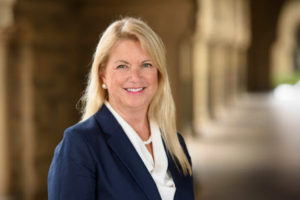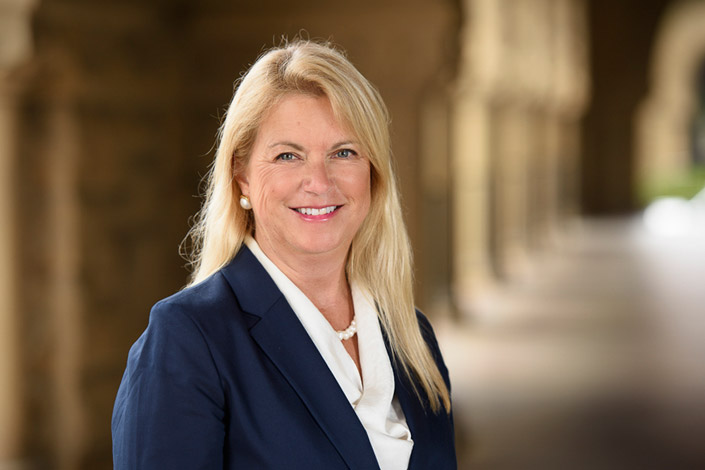Vice president for University communications Lisa Lapin MLA ’15 currently serves as the chief media spokesperson for Stanford. From providing public comment on controversial University decisions and running the Stanford News Service to responding to queries from The Daily, Lapin oversees the flow of information about Stanford within and without the bubble. Before joining Stanford in 2008, Lapin spent 15 years as a journalist and editor and earned a shared Pulitzer Prize for her coverage of the Loma Prieta earthquake at the San Jose Mercury News. The Daily sat down with Lapin to talk to her about her own experience with journalism, her work for university communications and her opinion on the state of news in the United States.

The Stanford Daily (TSD): Why did you decide to switch careers from journalism to university communications?
Lisa Lapin (LL): I’m still involved in communication, fact-gathering and information sharing, so in that respect it’s not a totally different career. I was a higher education writer, which really exposed me to universities. There were communications team in the universities I wrote about and covered and I always thought that it would be a great job. I always thought that if I were to ever leave the newsroom, working for a university would fill that same need that I have to be continually learning. Every single day that I work here at Stanford is completely different, and that’s the same thing that drew me to the newsroom. The opportunity to learn something new everyday – that’s very important for my own career satisfaction.
I believe strongly in what universities do: They educate future leaders of our world, they discover things that are transforming people’s lives. There’s not a better place to do what I do. The impact is so transformative and positive, and you couldn’t necessarily get that in a commercial enterprise.
TSD: How does your office handle controversial stories about Stanford in the news?
LL: We try very, very hard to help people get facts and basic information about Stanford. Sometimes it’s frustrating in this media environment when incorrect information will go viral and nobody calls to find out if it’s true or accurate, and trying to correct misinformation in this current digital world is extremely difficult. Controversy is fine – universities are about controversy. We are about the exchange of ideas, we are about debate, we are about questioning ideas and practices; that’s what we’re fundamentally about. In my realm, it’s the misinformation that is the most disturbing, and how readily misinformation spreads that has been the greatest challenge for me and for my counterparts at universities around the country.
TSD: What was the most important lesson you learned during your time as a journalist?
LL: I learned a lot about how the world works. I wrote about things, had access to people and places with many opportunities that the average person doesn’t get to see or know about. In many ways, it was a privilege. I learned about populations of people, societies and how the world works in an in-depth way that I could never have learned just from books or a classroom.
I also learned that there’s so much information that the world should know, and maybe that’s part of my attraction to universities – as a journalist I felt this obligation to share everything I knew. Part of my attraction to universities is that we surface knowledge, and I took that responsibility very seriously as a journalist. I take that responsibility very seriously here at Stanford. The primary job of my team is to help the world know all of the things that Stanford is learning and discovering. As a journalist, one of things I realized is how much we don’t even know about how our world works, how people live and what matters to people, and how we can improve world.
TSD: What was the most important lesson you learned about communication during your career?
LL: You can’t do enough. I think communication is one of the most important skills anyone can have for their entire lifetime. I really hope Stanford students think about that and avail themselves of every opportunity here at Stanford to take communication classes and to learn how to communicate more effectively. So many misunderstandings come about simply because people don’t communicate effectively.
TSD: What is your opinion about the state of news media today?
LL: Journalists are under immense pressure today. When I was a daily news reporter, I wrote a story a day, maybe two stories a day. I didn’t also need to handle social media. I didn’t need to take video and photos, there was a separate photographer who came with me. I didn’t have to post five updates to the web throughout the day and I could focus on a general content area; I covered politics, I covered education. Today, reporters have to do all of those things. The result is that much of the content that is produced is much more superficial, it doesn’t represent all perspectives as well because reporters don’t have time to learn and understand all perspectives.
Media organizations now, [like] local newspapers, have been supplanted by many more “dot-com” media platforms. They publish content now without it even being reviewed by an editor. In many cases, you see the lack of editing. You see a blurring of opinion and fact. You also see – because news organizations have so few resources to originate original content – [that] they pick up content regularly from just about any source without fact-checking. Errors get repeated, misinformation gets repeated. Organizations, governments and even Stanford are getting less scrutiny than when there were more people with more time to pay more attention to sharing information.
TSD: Could you tell us what it was like to report on the 1989 Loma Prieta earthquake, the work that helped you earn a shared Pulitzer Prize?
LL: I was fortunate to be at the San Jose Mercury News at the time. The Mercury News was going to do this intensive coverage of the bay area World Series. We had a special section of the newspaper set aside to just cover the World Series, but the paper decided to take the World Series section and convert it into an earthquake section. I was in downtown Palo Alto in a Mercury News office which was, at the time, on Hamilton Avenue, right across from the City Hall. Another great reporter, Pete Carey, and I were in the office together and the power went out, the phones went out, so we immediately went into downtown Palo Alto and saw shattered glass in front of all the storefronts.
We started reporting, it’s what you instinctively do. We started filling our notebooks from shop owners about their broken glass and the mess in downtown Palo Alto and we went into a RadioShack and bought transistor, battery-powered radio and turned it to the local news station and they started talking about the Bay Bridge collapsing, the Marina being on fire.
One of the things that struck me at the time was the cooperation among people. The Mercury News won a General News Reporting Prize because of the public service done by the newspaper in trying to get information to people. There was this unprecedented amount of cooperation between the San Francisco Chronicle and the Mercury News because the Chronicle didn’t have power and the Mercury News did down in San Jose, so the Mercury News actually published the San Francisco Chronicle down at our printing presses to help out the other newspaper. I had some work submitted for the entry, along with some other coworkers as part of the Pulitzer Prize entry, but it was very much a team effort.
TSD: Do you have any advice for students trying to pursue careers in communication, media or journalism?
LL: We’re losing a lot of our highly trained journalists, and too few people are going into it because they’re worried about the future. I think it’s as important now as ever. News organizations provide checks and balances. All of our public and private institutions, even Stanford, need scrutiny. The public needs to know what’s going on. It’s a really important line of work that doesn’t pay particularly well but it’s incredibly rewarding because it is so important to keep people informed and to keep people and organizations accountable.
I think the more Stanford students that go into the field, the better. In terms of just fundamental advice: Go get as much work experience as you can, as many internships as you can. You learn a huge amount that way. They are hard jobs today because time is of the essence, so it is now all about speed over depth and in some cases speed over quality. There are not that many places to do in-depth journalism anymore, but it’s vital.
This interview has been lightly edited and condensed.
Contact Lark Wang at larkw ‘at’ stanford.edu.
